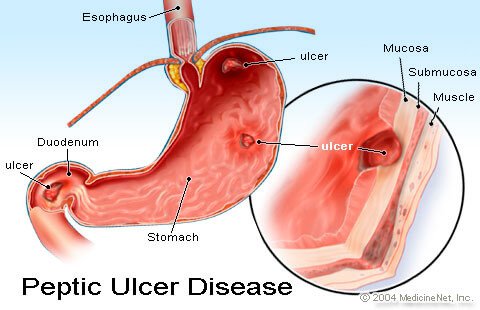here is a snippet on stomach ulcer
What is stomach ulcer?
Stomach ulcers are painful sores that can be found in the stomach lining or upper parts of small intestine, and this usually happen when the thick layer of mucus that protects the stomach from digestive juice is reduced, thus creating room for the digestive acids to eat away the lining tissues of the stomach. Are we scared already? Well, not to worry, Stomach ulcers can be cured, but they can also become severe without proper treatment.
Basically, there are two types of peptic ulcers:
I. Gastric ulcer: this occur at the stomach lining
II. Duodenal ulcer: this appears at the upper end of the small intestine.
Here are some of the causes of stomach ulcer:
Stomach ulcers are not necessarily caused by one single factor. The decrease in the stomach’s mucus lining that leads to an ulcer is usually caused by one of the following:
• an infection with the bacterium Helicobacter pylori (H. pylori)
• long-term use of non-steroidal anti-inflammatory drugs (NSAIDs), such as aspirin and ibuprofen
• Zollinger-Ellison syndrome, a rare disease that makes the body produce excess stomach acid
• smoking
• frequent use of steroids (such as those for treating asthma)
• family history of stomach ulcers
• excessive consumption of alcohol
Certain lifestyle changes can also help prevent ulcers from forming. Limiting alcohol consumption, avoiding tobacco products, and properly managing stress can all contribute to a healthy stomach lining.
Symptoms:
Other common symptoms include;
• dull pain in the stomach
• weight loss
• not wanting to eat because of pain
• nausea or vomiting
• bloating
• burping
• heartburn
• pain increases when you eat, drink, or take antacids
• Sudden, sharp pain that doesn’t stop
• black or bloody stools
Talk to your doctor if you experience symptoms of a stomach ulcer. Even though discomfort may be mild, ulcers can worsen if they aren’t treated. It’s important to promptly treat an ulcer. Talk to your doctor to discuss a treatment plan. Treatment will vary depending on the cause of your ulcer. Most ulcers can be treated with a prescription from a doctor, but in rare cases, surgery may be required. Symptoms of an ulcer may subside quickly with treatment. Even if your symptoms disappear, you should continue to take medicine prescribed by your doctor. This is to ensure that all bacteria are destroyed. Doctors will also suggest that you avoid smoking, alcohol, and any medications or foods that can trigger symptoms. The longer an ulcer remains untreated, the more likely you are to develop complications. You should seek treatment if you experience any of the following symptoms:
These could be signs that the ulcer has eroded through the stomach, or broken a blood vessel. Scar tissue development is another possible complication. The tissue can prevent food from moving from the stomach into the small intestine. All of these scenarios require intensive therapy
